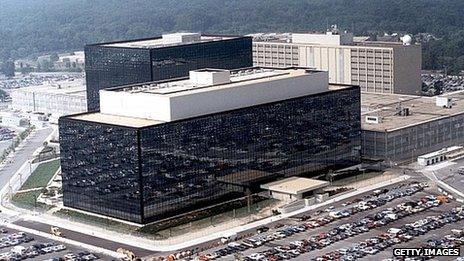NSA leaks: Obama hints at surveillance rethink
- Published
- comments
President Obama said the US had to "provide more confidence to the international community" over NSA activities
US President Barack Obama has suggested there may be a review of surveillance by the National Security Agency in the wake of a series of spying revelations.
He said in "light of disclosures that have taken place" and public concerns about the programmes "there may be another way of skinning the cat".
But Mr Obama said ex-NSA contractor Edward Snowden had caused "unnecessary damage" by leaking documents.
He declined to say whether or not Mr Snowden could be offered an amnesty.
Edward Snowden fled the US in late May, taking a huge cache of secret documents with him. He faces espionage charges in the US and has been granted temporary asylum in Russia.
President Obama made his comments at an end-of-year news conference at the White House.
Earlier in the week a federal judge declared the mass collection of telephone data unconstitutional and a presidential advisory panel suggested reforms.

The NSA was found to have engaged in large-scale trawling of phone call data
Both the judge and the panel said there was little evidence that any terror plot had been thwarted by the programme.
"There are ways we can do it, potentially, that gives people greater assurance that there are checks and balances, that there's sufficient oversight and sufficient transparency," Mr Obama said.
He said that programmes like the bulk collection of phone records "could be redesigned in ways that give you the same information when you need it without creating these potentials for abuse".
Mr Obama said he would make a "definitive statement" in January about recommendations by the White House panel.
"I have confidence in the fact that the NSA is not engaging in domestic surveillance or snooping around," he added.

Edward Snowden has his supporters in the US, as this Washington bus shows
"We may have to refine this further to give people more confidence. And I'm going to be working very hard on doing that."
On the subject of possibly granting Mr Snowden an amnesty, Mr Obama said: "I will leave it up to the courts and the attorney general to weigh in on Mr Snowden's case.''
On Friday, more details of people and institutions targeted by UK and US surveillance - from documents leaked by Edward Snowden - were published by The Guardian, The New York Times and Der Spiegel.
The papers said the list of about 1,000 targets included an EU commissioner, humanitarian organisations and Israeli officials including a prime minister.
They suggested that more than 60 countries were targets of the NSA and Britain's GCHQ.
The European Commission said in a statement that the claims, if true, "deserve our strongest condemnation".
"This is not the type of behaviour that we expect from strategic partners, let alone from our own member states."
In October, news that the NSA had monitored the phone of German Chancellor Angela Merkel triggered a diplomatic row between Berlin and Washington.
Brazil's President Dilma Rousseff was also angered by revelations that the NSA had hacked the computer network of Brazil's state-run oil company Petrobras to collect data on emails and telephone calls.